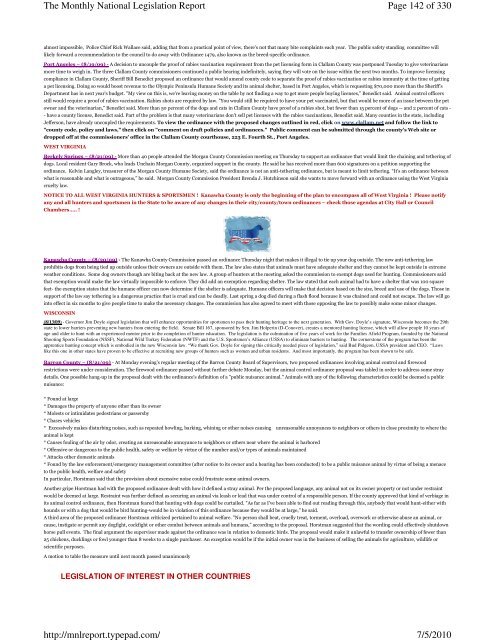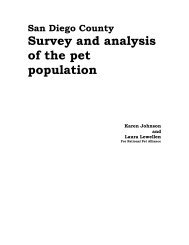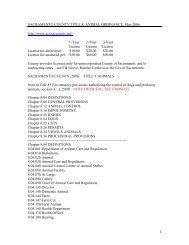Page 1 of 330 The Monthly National Legislation Report 7/5/2010 ...
Page 1 of 330 The Monthly National Legislation Report 7/5/2010 ...
Page 1 of 330 The Monthly National Legislation Report 7/5/2010 ...
You also want an ePaper? Increase the reach of your titles
YUMPU automatically turns print PDFs into web optimized ePapers that Google loves.
<strong>The</strong> <strong>Monthly</strong> <strong>National</strong> <strong>Legislation</strong> <strong>Report</strong>http://mnlreport.typepad.com/<strong>Page</strong> 142 <strong>of</strong> <strong>330</strong>7/5/<strong>2010</strong>almost impossible, Police Chief Rick Wallace said, adding that from a practical point <strong>of</strong> view, there's not that many bite complaints each year. <strong>The</strong> public safety standing committee willlikely forward a recommendation to the council to do away with Ordinance 1479, also known as the breed-specific ordinance.Port Angeles – (8/19/09) - A decision to uncouple the pro<strong>of</strong> <strong>of</strong> rabies vaccination requirement from the pet licensing form in Clallam County was postponed Tuesday to give veterinariansmore time to weigh in. <strong>The</strong> three Clallam County commissioners continued a public hearing indefinitely, saying they will vote on the issue within the next two months. To improve licensingcompliance in Clallam County, Sheriff Bill Benedict proposed an ordinance that would amend county code to separate the pro<strong>of</strong> <strong>of</strong> rabies vaccination or rabies immunity at the time <strong>of</strong> gettinga pet licensing. Doing so would boost revenue to the Olympic Peninsula Humane Society and its animal shelter, based in Port Angeles, which is requesting $70,000 more than the Sheriff'sDepartment has in next year's budget. "My view on this is, we're leaving money on the table by not finding a way to get more people buying licenses," Benedict said. Animal control <strong>of</strong>ficersstill would require a pro<strong>of</strong> <strong>of</strong> rabies vaccination. Rabies shots are required by law. "You would still be required to have your pet vaccinated, but that would be more <strong>of</strong> an issue between the petowner and the veterinarian," Benedict said. More than 50 percent <strong>of</strong> the dogs and cats in Clallam County have pro<strong>of</strong> <strong>of</strong> a rabies shot, but fewer than 15 percent <strong>of</strong> dogs -- and 2 percent <strong>of</strong> cats -- have a county license, Benedict said. Part <strong>of</strong> the problem is that many veterinarians don't sell pet licenses with the rabies vaccinations, Benedict said. Many counties in the state, includingJefferson, have already uncoupled the requirements. To view the ordinance with the proposed changes outlined in red, click on www.clallam.net and follow the link to"county code, policy and laws," then click on "comment on draft policies and ordinances." Public comment can be submitted through the county's Web site ordropped <strong>of</strong>f at the commissioners' <strong>of</strong>fice in the Clallam County courthouse, 223 E. Fourth St., Port Angeles.WEST VIRGINIABerkely Springs – (8/21/09) - More than 40 people attended the Morgan County Commission meeting on Thursday to support an ordinance that would limit the chaining and tethering <strong>of</strong>dogs. Local resident Gary Brock, who leads Unchain Morgan County, organized support in the county. He said he has received more than 600 signatures on a petition supporting theordinance. Kelvin Langley, treasurer <strong>of</strong> the Morgan County Humane Society, said the ordinance is not an anti-tethering ordinance, but is meant to limit tethering. “It’s an ordinance betweenwhat is reasonable and what is outrageous,” he said. Morgan County Commission President Brenda J. Hutchinson said she wants to move forward with an ordinance using the West Virginiacruelty law.NOTICE TO ALL WEST VIRGINIA HUNTERS & SPORTSMEN ! Kanawha County is only the beginning <strong>of</strong> the plan to encompass all <strong>of</strong> West Virginia ! Please notifyany and all hunters and sportsmen in the State to be aware <strong>of</strong> any changes in their city/county/town ordinances – check those agendas at City Hall or CouncilChambers….. !Kanawha County – (8/20/09) - <strong>The</strong> Kanawha County Commission passed an ordinance Thursday night that makes it illegal to tie up your dog outside. <strong>The</strong> new anti-tethering lawprohibits dogs from being tied up outside unless their owners are outside with them. <strong>The</strong> law also states that animals must have adequate shelter and they cannot be kept outside in extremeweather conditions. Some dog owners though are biting back at the new law. A group <strong>of</strong> hunters at the meeting asked the commission to exempt dogs used for hunting. Commissioners saidthat exemption would make the law virtually impossible to enforce. <strong>The</strong>y did add an exemption regarding shelter. <strong>The</strong> law stated that each animal had to have a shelter that was 100 squarefeet- the exemption states that the humane <strong>of</strong>ficer can now determine if the shelter is adequate. Humane <strong>of</strong>ficers will make that decision based on the size, breed and use <strong>of</strong> the dogs. Those insupport <strong>of</strong> the law say tethering is a dangerous practice that is cruel and can be deadly. Last spring a dog died during a flash flood because it was chained and could not escape. <strong>The</strong> law will gointo effect in six months to give people time to make the necessary changes. <strong>The</strong> commission has also agreed to meet with those opposing the law to possibly make some minor changes.WISCONSIN(8/13/09) - Governor Jim Doyle signed legislation that will enhance opportunities for sportsmen to pass their hunting heritage to the next generation. With Gov. Doyle’s signature, Wisconsin becomes the 29thstate to lower barriers preventing new hunters from entering the field. Senate Bill 167, sponsored by Sen. Jim Holperin (D-Conover), creates a mentored hunting license, which will allow people 10 years <strong>of</strong>age and older to hunt with an experienced mentor prior to the completion <strong>of</strong> hunter education. <strong>The</strong> legislation is the culmination <strong>of</strong> five years <strong>of</strong> work for the Families Afield Program, founded by the <strong>National</strong>Shooting Sports Foundation (NSSF), <strong>National</strong> Wild Turkey Federation (NWTF) and the U.S. Sportsmen’s Alliance (USSA) to eliminate barriers to hunting. <strong>The</strong> cornerstone <strong>of</strong> the program has been theapprentice hunting concept which is embodied in the new Wisconsin law. “We thank Gov. Doyle for signing this critically needed piece <strong>of</strong> legislation,” said Bud Pidgeon, USSA president and CEO. “Lawslike this one in other states have proven to be effective at recruiting new groups <strong>of</strong> hunters such as women and urban residents. And most importantly, the program has been shown to be safe.Barron County – (8/21/09) - At Monday evening's regular meeting <strong>of</strong> the Barron County Board <strong>of</strong> Supervisors, two proposed ordinances involving animal control and firewoodrestrictions were under consideration. <strong>The</strong> firewood ordinance passed without further debate Monday, but the animal control ordinance proposal was tabled in order to address some straydetails. One possible hang-up in the proposal dealt with the ordinance's definition <strong>of</strong> a "public nuisance animal." Animals with any <strong>of</strong> the following characteristics could be deemed a publicnuisance:* Found at large* Damages the property <strong>of</strong> anyone other than its owner* Molests or intimidates pedestrians or passersby* Chases vehicles* Excessively makes disturbing noises, such as repeated howling, barking, whining or other noises causing unreasonable annoyances to neighbors or others in close proximity to where theanimal is kept* Causes fouling <strong>of</strong> the air by odor, creating an unreasonable annoyance to neighbors or others near where the animal is harbored* Offensive or dangerous to the public health, safety or welfare by virtue <strong>of</strong> the number and/or types <strong>of</strong> animals maintained* Attacks other domestic animals* Found by the law enforcement/emergency management committee (after notice to its owner and a hearing has been conducted) to be a public nuisance animal by virtue <strong>of</strong> being a menaceto the public health, welfare and safetyIn particular, Horstman said that the provision about excessive noise could frustrate some animal owners.Another gripe Horstman had with the proposed ordinance dealt with how it defined a stray animal. Per the proposed language, any animal not on its owner property or not under restraintwould be deemed at large. Restraint was further defined as securing an animal via leash or lead that was under control <strong>of</strong> a responsible person. If the county approved that kind <strong>of</strong> verbiage inits animal control ordinance, then Horstman feared that hunting with dogs could be curtailed. "As far as I've been able to find out reading through this, anybody that would hunt-either withhounds or with a dog that would be bird hunting-would be in violation <strong>of</strong> this ordinance because they would be at large," he said.A third area <strong>of</strong> the proposed ordinance Horstman criticized pertained to animal welfare. "No person shall beat, cruelly treat, torment, overload, overwork or otherwise abuse an animal, orcause, instigate or permit any dogfight, cockfight or other combat between animals and humans," according to the proposal. Horstman suggested that the wording could effectively shutdownhorse pull events. <strong>The</strong> final argument the supervisor made against the ordinance was in relation to domestic birds. <strong>The</strong> proposal would make it unlawful to transfer ownership <strong>of</strong> fewer than25 chickens, ducklings or fowl younger than 8 weeks to a single purchaser. An exception would be if the initial owner was in the business <strong>of</strong> selling the animals for agriculture, wildlife orscientific purposes.A motion to table the measure until next month passed unanimouslyLEGISLATION OF INTEREST IN OTHER COUNTRIES




